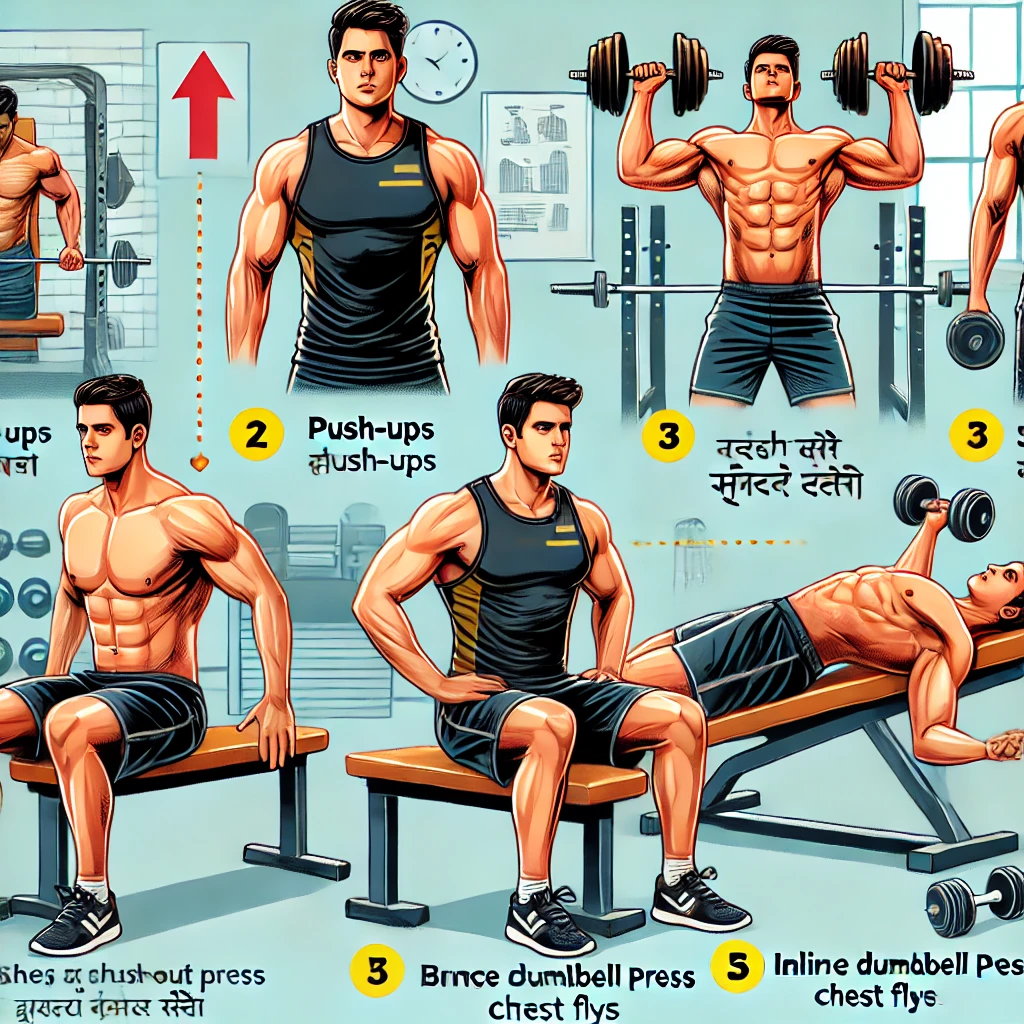
Fitness track
How to Gain Weight Fast in 1 Week: A Complete Guide


DINKAR
11/12/2024
How to Gain Weight Fast in 1 Week: A Complete Guide
Are you looking to gain weight quickly? For some, it might seem like a daunting challenge to put on weight in a healthy way, especially if you have a fast metabolism, a busy lifestyle, or specific dietary needs. But gaining weight in a week is achievable with the right strategy and mindset. This article will guide you through effective tips on how to gain weight in a week without compromising your health.
Why Gaining Weight Can Be Difficult
While most people struggle with losing weight, gaining weight can be just as challenging for others. People with a high metabolism or those who are naturally lean may find it difficult to reach their desired weight. Here are a few reasons why gaining weight can be hard:
- High Metabolism: Some people have a naturally faster metabolism that burns calories quickly, making it difficult to accumulate extra weight.
- Poor Appetite: Stress, lifestyle factors, or underlying health conditions can reduce appetite, making it hard to consume enough calories.
- Busy Lifestyle: Eating enough high-calorie meals can be challenging when you’re on the go.
How to Gain Weight Fast in 1 Week: Effective Strategies
If you’re committed to gaining weight in one week, you’ll need a focused approach that involves increasing your calorie intake, balancing your macros, and adjusting your lifestyle. Here are some actionable steps to get started.
1. Increase Your Caloric Intake
To gain weight, you need to consume more calories than your body burns. The goal is to create a calorie surplus, which means eating more than your daily caloric needs. Here’s how to get started:
- Determine Your Baseline Caloric Needs: Use an online calculator to find your maintenance calories, which are the calories you need to maintain your current weight. Then, aim to consume 500-1000 calories more than your maintenance level.
- Choose High-Calorie Foods: Eating calorie-dense foods like nuts, avocados, olive oil, full-fat dairy, and whole grains can help you pack in calories without feeling overly full.
- Focus on Healthy Sources: Avoid empty-calorie foods that provide little nutritional value. Processed junk foods might offer quick calories, but they lack the nutrients necessary for healthy weight gain.
2. Eat More Frequent Meals and Snacks
Eating larger portions can feel overwhelming, especially if you have a low appetite. Instead, aim for smaller, frequent meals and snacks to increase your calorie intake gradually throughout the day.
- Add Meals and Snacks: Instead of the standard three meals, try to eat five to six times a day, including nutrient-rich snacks.
- Timing Is Key: Eat every 2-3 hours, and include a late-night snack to help sustain your calorie surplus.
3. Increase Protein Intake
Protein is crucial for muscle growth and can help you gain weight in a healthy way. It also prevents fat gain by supporting lean muscle mass development.
- Aim for Protein-Rich Foods: Lean meats, poultry, eggs, fish, dairy products, nuts, and legumes are excellent sources.
- Supplement with Protein Shakes: If you struggle to meet your protein goals through food alone, protein shakes and smoothies are a quick and convenient option.
Recommended Daily Protein Intake: Aim for 0.8-1 gram of protein per pound of body weight.
4. Don’t Forget Healthy Fats
Healthy fats provide a significant number of calories in a small amount, making it easier to increase your caloric intake without overeating.
- Use Cooking Oils: Add olive oil, coconut oil, or avocado oil when cooking. These oils not only add flavor but are calorie-dense and nutritious.
- Include Nuts and Seeds: Almonds, walnuts, chia seeds, and flaxseeds are excellent snacks and can be sprinkled on meals to add extra calories and healthy fats.
5. Focus on Strength Training
To ensure that the extra calories you consume are used for muscle growth rather than just fat storage, incorporate strength training into your routine. This will help you build lean muscle, which will contribute to healthy weight gain.
- Compound Exercises: Focus on exercises like squats, deadlifts, bench presses, and rows. These compound movements engage multiple muscle groups, promoting muscle growth and strength.
- Aim for Progressive Overload: Gradually increase the weights you lift over time to continue challenging your muscles and stimulating growth.
6. Drink High-Calorie Smoothies and Shakes
Drinking your calories can be a lot easier than eating them, especially if you have a low appetite. High-calorie smoothies and shakes can pack in nutrients, proteins, healthy fats, and complex carbohydrates.
- Create Nutrient-Dense Shakes: Blend fruits, full-fat milk or yogurt, a scoop of protein powder, peanut butter, and some oats for a calorie-packed shake.
- Avoid Sugar-Loaded Drinks: Stick to homemade options as they’re more nutritious and free from artificial sugars and additives.
7. Avoid Empty Calories
While it may be tempting to go for sugary snacks and processed foods, they won’t contribute to healthy weight gain. Instead, choose nutrient-dense foods that provide essential vitamins, minerals, and macronutrients.
- Limit Sugary and Processed Foods: Foods like soda, candy, and chips may add calories, but they’re often empty and devoid of beneficial nutrients.
- Choose Whole Foods: Whole grains, lean proteins, fruits, and vegetables provide the nutrients your body needs for healthy weight gain.
8. Track Your Progress
Keeping a food journal or using a calorie-tracking app can help you stay on track. By monitoring your food intake and weight, you’ll know if your efforts are effective and can adjust as needed.
- Monitor Your Weight Daily: Check your weight at the same time each day to track your progress.
- Adjust as Needed: If you’re not gaining weight, increase your caloric intake slightly or focus on consuming more calorie-dense foods.
Sample 1-Week Meal Plan for Quick Weight Gain
To help you get started, here’s a sample meal plan for one day that focuses on high-calorie, nutrient-rich foods.
Day 1
- Breakfast:
- Omelet with cheese, spinach, and tomatoes
- 2 slices of whole-grain toast with avocado
- Glass of full-fat milk
- Mid-Morning Snack:
- Greek yogurt with honey and a handful of mixed nuts
- Lunch:
- Grilled chicken breast with quinoa, roasted vegetables, and a drizzle of olive oil
- Side of avocado slices
- Afternoon Snack:
- Peanut butter banana smoothie (banana, whole milk, 1 tbsp peanut butter, protein powder)
- Dinner:
- Salmon fillet with sweet potato, green beans, and a small side salad with olive oil dressing
- Late-Night Snack:
- Cottage cheese with berries and a few walnuts
Common Mistakes to Avoid
When trying to gain weight quickly, people often make mistakes that hinder their progress. Here are a few common pitfalls to avoid:
- Skipping Meals: Even if you feel full, try to stick to a consistent eating schedule.
- Lack of Consistency in Exercise: Building muscle requires regular strength training. Skipping workouts can lead to fat gain instead of lean muscle.
- Eating Junk Foods: Processed foods may seem like an easy calorie source but can lead to unwanted health issues.
Final Thoughts
Gaining weight fast in one week is possible with the right approach. By increasing your calorie intake, focusing on nutrient-dense foods, and incorporating strength training, you’ll be able to see noticeable changes in just seven days. Keep in mind that weight gain should be gradual and healthy—aim to build lean muscle rather than accumulate fat. Stick to a balanced, calorie-rich diet and stay consistent with exercise, and you’ll be well on your way to a healthier, more robust physique.